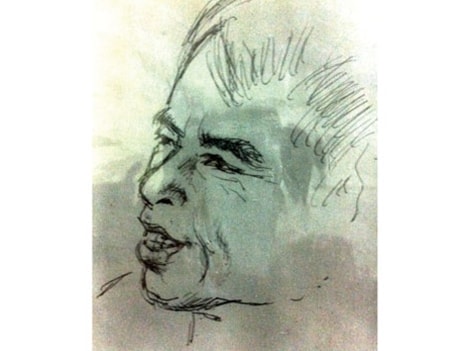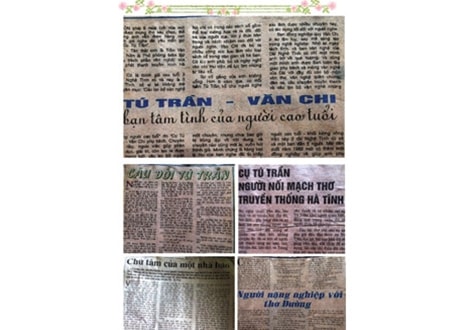Spring Day Remembering the Tet Newspaper Workers
Tet newspaper is a yearly specialty of the press village, inviting people, inviting the community to read, listen, watch and enjoy during Tet... Just like sticky rice, fragrant rice, carefully saved and nurtured all year by the villagers, carefully prepared to offer to ancestors, gods and Buddhas. Equally sacred, equally respected. That is why the leaders of the newspapers pay great attention.
First is to order articles, announce in the newspaper, on other media, invite letters, phone calls, etc. With experienced editors and editors, there are a thousand and one ways to make the Spring newspaper more quality.
The above is the work of editors and editors-in-chief, but journalists who write Tet articles have their own way. Unlike journalists in the Current Affairs section, writers write for Spring newspapers very early. Usually, a few months before Tet, when winter has just begun and the rain and wind are still pouring, our families have already begun to... celebrate Tet. Writing in nostalgia, writing in a state of ecstasy to offer.
Alone, a Tet, a Spring. Clouds still drift in the small room, drizzle hangs in the hot sun, shirtless, writing about scarves, about wool coats and cotton coats. Stomach aching, dieting, still writing about pickled onions and fatty meat. Readers never know what is real and what is fake on the Tet writing pages. Just like people who make votive offerings and flowers, Spring and Tet come early to each profession, each village. Seeing Tet before others see it, loving the colors of flowers before they have buds or sprouts. The Tet and Spring newspaper pages are really a lot of effort. The Tet newspaper profession is also very laborious... (!).
 |
| Journalist Van Chi, sketch by Hoang Nguyen Ai. |
With spoken and visual newspapers (Radio, Television), journalists also have many good stories to remember. Unlike print newspapers, television must have pictures. When talking about peach blossoms, there must be peach blossoms. And not the kind of peach blossoms that last year still smiled at the winter wind, but this year's peach blossoms, the current events peach blossoms. Writing Tet articles at a certain enterprise also had to wait until near Tet, it couldn't come early like the poet. So people rushed to do reports when Tet was near, when sometimes there were peach blossoms and kumquat trees.
The screen is only truly Tet when it has the yellow and red colors of Spring. Then pray that it is only drizzling and not pouring. Machines worth hundreds of millions of dong cannot be soaked in the rain. After the rain is covered and the image is recorded, there are still many steps. Writing the lyrics, submitting them for approval for the announcer to read. Then sending them to the Center for editing, sending them to the technicians. Everyone needs them, every song is important, especially everyone is in a hurry to finish it quickly. To go home, Tet is already in front of us.
In the field of Radio and Television journalism, only Radio Literature and Arts is still similar to printed newspapers. It takes time, cunning, and persuasion to have good works. Veteran editors in the profession in Nghe - Tinh like the late journalist Van Chi had many memorable things to have radio literature and arts works during Tet. I want to mention him so that listeners of Nghe radio will remember how a radio journalist lived and died for Tet newspapers.
Every year around September and October of the lunar calendar, when the cold monsoon winds were blowing at night, he often asked me to stay: "Why are you coming back? It's so cold. I have something really good. I'll read it to you tonight." There's nothing more fun than having guests, and guests who eat together and stay the night together. A few years ago, my youngest son stayed with me. Now he's accepted into the journalism university in Hanoi. Many nights, when he's alone, he misses his son and has trouble sleeping.
When there were guests, he would rush to the market and pay for everything. Then he would cook and stir-fry, while everyone else slurped. When he was done, he would pull a chair out onto the porch to drink water and listen to the radio. After listening to the provincial program, he would listen to the Central program. He would not watch TV. Absolutely not. How strange! A person in Radio and Television who did not watch TV. Gradually, I learned that he did not want to watch TV because he was afraid of distraction. He wanted to focus all his energy on radio broadcasting.
The interesting thing that he asked me to stay during those winter nights was the Tang Dynasty poems, the Tet antithetical couplets... That this year is the year of the Monkey, so we should use this rhyme... that this ending is unique and profound. I listened attentively to him reading and recognized that Van Chi's poems were indeed witty and profound.
Every year, I often heard Van Chi's Tang poetry before he called for responses to celebrate Tet. It was also a way for him to publish early to solicit opinions from friends. If he had a good poem, in addition to the fee for feeding guests with Tet poems, he also invited his fellow poets in the group to Nghen to drink wine and listen to poetry. He was happiest when he had a quality Tet cultural program.
Looking at the stack of Tet tapes carefully arranged, with the broadcast schedule divided for each session, until the last day of Tet week, he was very satisfied. His face was bright. When handing them over to the radio room, he was as careful as a ceremonial person. His face could not hide his pride when looking at the News reporters who were frowning because of the rain, and were miserable waiting for the broadcast.
His art program was done, he went through the specialized departments, and even if there was nothing to do, he would still jump in to join in the conversation. At times like that, Director Nguyen Cong Tien and Deputy Director Thai Ngu all looked at Van Chi with respect and admiration. The Radio Art Program had been completed in a very glorious way. He was proud of that, not caring about the bonuses, envelopes, and red envelopes that someone or some department was gossiping about. The finished product on the air was his Tet gift, a way to repay the kindness of the writers and listeners. He was happiest at this moment!
 |
| There have been many articles written about journalist Van Chi. |
It was worth it, many cold and rainy nights, he still cycled to each employee's house in the department, giving instructions on what to do when recording the Tet program. The employees sat in the warm room, gathered with their families, looking with concern at their old boss, wearing a short, shabby raincoat, standing under the porch rain, not going inside for fear of getting dirty. After giving instructions, they turned around and cycled back home.
That's Van Chi's personality, gentle, easy-going, but extremely dedicated to his work. All his life he only cared about his studies. That's why the program Tu Tran tells stories (Tu Tran is his pen name), one program every week, he collected, edited and read it himself in front of the camera. No program was repeated. He maintained it on the air for nearly 15 years. The Editorial Board of Ha Tinh Radio and Television Station provided funding to publish 2 thick volumes of "Tu Tran tells stories". He considered it the highest reward for a professional, not easy for everyone to get.
His house, facing the south, was quite cozy, but when he slept, he often wore a Russian-style fur hat with two straps tied tightly under his chin. At night, he often left the door open. I wondered why. He said he had a habit of screaming loudly in his sleep, as if he were being paralyzed. At times like that, if someone came in and woke him up, he would wake up without feeling tired.
If he were left alone to cry for a long time, he would be as tired as a seriously ill person the next morning. I asked the people living next to Van Chi's house, and they all said it was true. Some even reminded him to leave the door open, in case he cried, he could come in. Everyone said the same thing, that when they woke Van Chi up like that, they felt so sorry for him.
Later I learned that Van Chi had a mental illness because when he was at Nghe Tinh Radio Station, during Tet, he struggled to write several radio plays. Before that, every year, he wrote a play every week, both directing and acting. He worked so hard that Tet he got sick. He was hospitalized at night and still shouted the lines in his plays. After the province was divided, he recovered and brought back to Ha Tinh Radio Station a whole archive of documents. Radio plays, folk songs. That was enough for nearly 10 years. And he also brought back the habit of screaming loudly at night.
Van Chi's love for the profession when doing Radio Arts was not only enjoyed by listeners in a large area of Nghe Tinh, but also by collaborators from distant provinces such as Thai Binh, Hai Duong, Hai Phong, Ho Chi Minh City, Vung Tau who also contributed articles to the program he was in charge of. That love was like adding creative energy, encouraging us, so that out of the 3 staff members of the Arts Department he was in charge of, 2 of them later became members of the Vietnam Writers Association (Nhu Binh, Phan Quoc Binh).
For me, the most memorable is the last Tet before Van Chi retired. He read me two pairs of Tet couplets. The self-proclaimed verses: "Why celebrate, why wish, sixty years old, sixty foolish things/ Rich is the same, poor is the same, thirty thousand days, thirty thousand worries".
I asked: "Everyone knows the foolish things in your life, you are only good at your job, what are you worried about?" Worrying about your studies! He laughed and said, it still haunts him until now. Then he continued reading. His eulogy:
Welcome back to the Underworld
Hello everyone in the world.
I was startled: "What a mistake, sir, why are you bringing this up during Tet?". Van Chi said: "I think I have fulfilled my duty in life, so going is a happy thing. What a mistake?". Van Chi laughed calmly, but I still could not hide my vague fear. Then the mistake really haunted him.
A year after Tet, on the day he entered the provincial Literature and Arts Congress, as soon as he got off his motorbike, he was hit by a poor motorbike taxi driver who was rushing to get a passenger, knocking Van Chi out onto the street. And so he was gone, gone forever... My friends and I were shocked, walking under the two lines of his autobiography, painfully remembering a kind senior journalist who had been with us for so many years.
Tet holiday, Spring day again feel so much nostalgia!
According to CAND
| RELATED NEWS |
|---|

